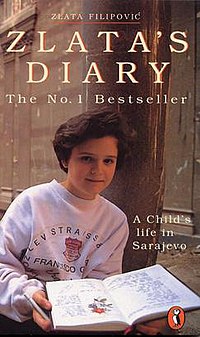Zlata's Diary

Zlata's Diary (ISBN 0-14-024205-8) is a non-fiction book by Zlata Filipović, who was a young girl living in Sarajevo while it was under siege.
Background
Zlata Filipovic was born on 3 December 1980.[1] She lived in Sarajevo before the Bosnian war started. During the war, Zlata kept a diary from 1991 to 1993. Like Anne Frank, she also gave a name to her diary, Mimmy. Zlata and her family survived the war and escaped to Paris in 1993, where they stayed for a year. The family has settled down in Dublin, Ireland. This girl mentions in her diary that there was multiple gunshots next to her house.
Plot
In September 1991, Zlata was given a diary. She immediately began to write in her diary. Zlata Filipović wrote her diary from 1991 to 1993 during the Bosnian war. Located mostly in Sarajevo, the capital of Bosnia. Zlata began writing her diary in 1991, just after she began fifth grade. The war began just before her eleventh birthday. Zlata's diary chronicles her daily life and the war's increasing impact on her home town of Sarajevo. Reporter Janine di Giovanni, who met Zlata in 1993 and wrote the introduction to the book, described Zlata as "the Anne Frank of Sarajevo." Like The Diary of Anne Frank, Zlata's diary contains many descriptions of the horrors of war as viewed from the innocent view of a child. Furthermore, both diaries take place during conflicts at least partially motivated by racism and ethnic differences.
Publication
In 1992, a small press in Sarajevo published Zlata's diary and released it for the UNICEF week.[2] Following the release of her diary, Zlata became moderately famous. International journalists visited the Filipović family's apartment and interviewed Zlata. In December 1993, the United Nations helped Zlata and her mother move to Paris.
Her diary has also been adapted into a choral work by Anthony Powers.[citation needed]
Reception
Critical reception of the book was positive. In The New York Times Review of Books, Francine Prose praised the 'pure innocence and desperation' evident within Zlata's pages, characterizing her as an everygirl. However, Prose was critical of Western publishers looking to cash in by equating Zlata's story with that of Anne Frank, lamenting the indecency of 'contrasting and judging the private writings of children in war'.[3]
References
- ^ Zlata chat Archived 2007-11-18 at the Wayback Machine, mv.com; accessed 7 March 2016.
- ^ Baum, Geraldine (15 March 1994). "Dreams of Peace : When Zlata Filipovic began her diary, she did not know her words would launch her family's escape from the war in Bosnia. Now free from mortar shells and hunger, the girl is hoping the journal--a best-selling book--will aid the children of Sarajevo". Los Angeles Times. Retrieved 13 February 2020.
- ^ Prose, Francine (6 March 1994). "A Little Girl's War". The New York Times. Retrieved 13 February 2020.
